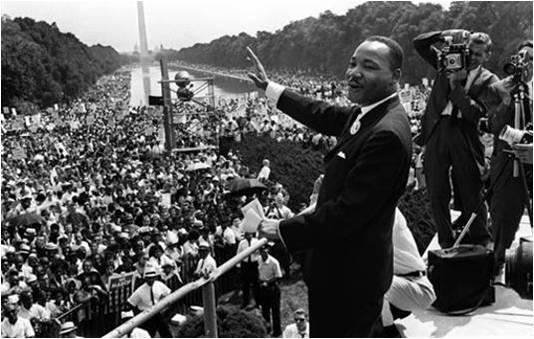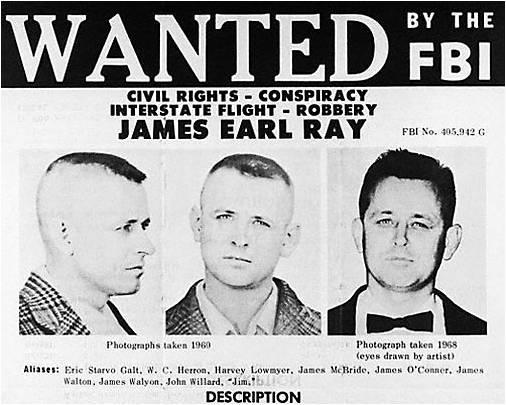Death of Martin Luther King
In the morning of the 4th, James Earl Ray fatally shot Martin Luther King by coming to the hotel room where he was staying.
The only photograph that captures the horror of the moment of Marting Luther King’s death was taken by a South African young man, Joseph Louw, who was shooting a documentary about the activist.
Louw had been having dinner in a Memphis restaurant right before the tragedy, but left earlier to watch the evening news on NBC. As soon as he arrived to the Lorraine Motel, he heard a shot. He ran to the site and saw Luther King on the floor. Realising that there was nothing he could do, he rushed to get his camera.
“It was just a matter of realising the horror of the thing. Then I knew I must record it for the world to see”.
Even though they weren’t there, TV channels quickly spread the news. Due to the time of the events (when evening news was being broadcast), many anchors received the information when they were on air, which caused some mistakes.
Normal programming was interrupted as soon as Martin Luther King’s death was confirmed. Although the TV networks had journalists in Memphis, they didn’t go to the location due to the official impositions in the city in order to prevent violence.
The Media coverage of the death and the uprisings that followed went on for days. Martin Luther King’s death was covered in morning and afternoon shows, as well as special editions.
Cancelling a trip to Hawaii, President Lyndon Johnson talked to the nation that very same night to express his shock and sadness for Martin Luther King’s death. The speech was broadcast live by the three main TV channels.
“America is shocked and saddened by the brutal slaying tonight of Dr. Martin Luther King.
I ask every citizen to reject the blind violence that has struck Dr. King, who lived by nonviolence.
(…) I know that every American of good will joins me in mourning the death of this outstanding leader and in praying for peace and understanding throughout this land”.
Luther King’s death shocked and weakened a nation wounded, divided and shaken by uprisings and protests, social conflicts and a controversial war.
It generated violent protests, set on fire a simmering country and originated a manhunt which lasted two months. It shaped a generation.
It immortalised the man and gave birth to the symbol of civil rights, equality, peace and justice for everyone. Would it have been like this, any other way?
If Martin Luther King’s death immortalised him at 39 years old (at a time he was actually registering a popularity decrease), the fight of his life led to drastic changes in the Media coverage about the rights of black people and even social affairs.
Luther King’s charisma and singular oratorical capacity made him a desirable Media personality, which allowed him to get air time and mark the agenda.
In August 1963, Martin Luther King promoted the famous Washington march. A spectacular Media event, according to Walter Cronkite, one of the most popular anchors on American TV.
The event was broadcast live on the radio and on the three television channels that existed at the time. He turned the fight for civil rights mainstream, with a brand and a signature: “I have a dream”.
"Technology shapes the way a story is covered, the way it's presented (…) Television during the 1960s presented narratives. It allowed people to be in front of the camera and allowed them to be seen and for their voices to literally be heard,” stated William Thomas, chairman of the Department of History at the University of Nebraska-Lincoln.
But King’s speech almost didn’t happen. King and his consultants worked on the text for over a week and the reverend kept on working on it until the last minute, erasing words and adding new phrases. On the day before the speech, the draft didn’t have any reference to a “dream”. Martin Luther King always looked for a perfect ending for his speeches. Since his life was constantly threatened, he insisted on a prophetic tone, as though those were his last words.
The day before the Washington march, he pondered whether he should mention the “dream” and if that would be an emotional ending for his speech. He had been talking about his “dream” in speeches all over the country for months, defending his vision of a racial coexisting in harmony. He asked for the opinion of two of his consultants. One of them, Wyatt Tee Walker, advised him not to use the sentence “I have a dream.”
It was too cliché, King had used it too many times, he said. The second consultant, Andrew Young, agreed. King didn’t say a thing. But that night someone heard him repeating the same words in his hotel room, after everyone had gone to bed: “I have a dream... I have a dream... I have a dream... I have a dream...”
The rhythm and musicality, the cadence and intonation of the speech reminded the audience of Martin Luther King’s past as a pastor of the Baptist church. As most Americans, who were watching the Washington March on television, President John F. Kennedy listened to a Martin Luther King’s speech in full for the first time on that day. He commented with one of his assistants, in the White House, that he was “damn good.”
Martin Luther King, Jr. I Have A Dream Speech
Martin Luther King, Jr. I Have A Dream Speech
The conspiracy theories surrounding Martin Luther King’s death, involving the government and CIA, also contributed for the perpetuation of the myth.
Narratives that still captivate the Media and public opinion to this day.
Barack Obama’s election brought back the memory of Martin Luther King and his speeches. Passionate. Moving. Fracturing. Historical. The comparisons were unavoidable, as though the new President of the US would finally make the “dream” come true.
Over 40 years after “I have a dream,” another black leader said and repeated in the same speech a sentence that would also get a place in History: “Yes we can.”
And if in the 60s television was the medium that propelled Luther King to fame and gave him visibility – for the important role he had as an opinion maker –, in 2008 Social Media had a central role in the election of Barack Obama.
From his speech in New Hampshire, singer will.i.am gathered around 30 actors and musicians on a support video (supposedly non official) posted on YouTube that became global.
It wasn’t a surprise, therefore, that when Barack Obama took office, U2 sang live, with a global broadcast, from Washington, from the same staircase where Martin Luther King made his symbolic speech, the song that is dedicated to him: “Pride, in the name of love.”
U2 Concert Barack Obama
U2 Concert Barack Obama
The fight for black people’s civil rights in the 60s and Martin Luther King’s live has inspired songs, books, documentaries and films, especially since the issue of racial discrimination is far from over in the US.
In 2014, “Selma” arrived to the movie theatres, a movie that showed a more human side of the leader. A hero with doubts and contradictions, who had little victories but also a lot of defeats. The film was immediately associated with protests which had occurred in Ferguson, giving the impression that the dream isn’t actually over.













